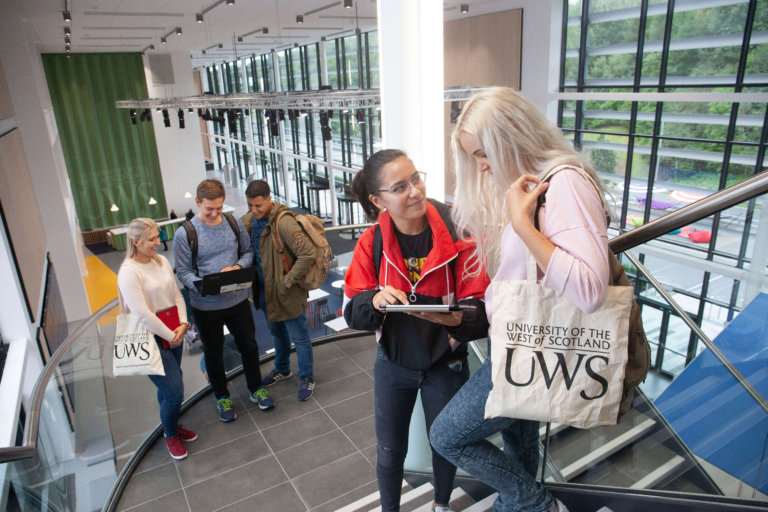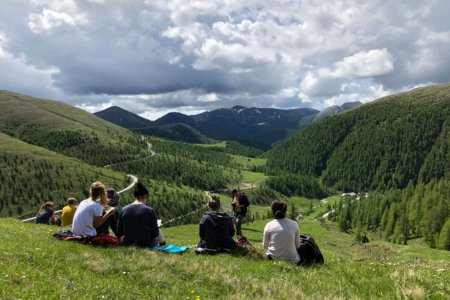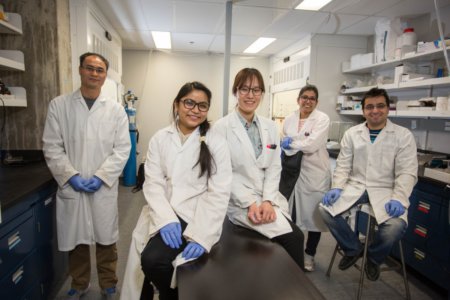
From the humble wheel to nuclear reaction, scientists and engineers have consistently sparked progress for humanity. They include luminaries like Edward Jenner, founder of vaccines; Sir Alexander Fleming, creator of penicillin; Albert Einstein, developer of the theory of relativity; and Marie Curie, pioneer of research on radioactivity.
To follow in their footsteps, forge a solid start through a STEM (that’s Science, Technology, Engineering and Mathematics) degree. Each of these branches comprises various specialised yet overlapping disciplines that often possess their own nomenclature and expertise — find your niche and you could be creating a better future for all.
Here are four universities that offer STEM degrees that will help start your journey:
University of the West of Scotland: School of Computing, Engineering and Physical Sciences
A vibrant international student community. Research-informed and industry-relevant programmes. A location in Scotland, alive with a culture of food, drink, heritage, highlands and islands. These are the traits that define an education at the University of the West of Scotland.
UWS’s origins date back to 1897. Today, it is one of the UK’s most innovative modern universities — ranking in the top 130 of universities worldwide under 50-years-old (Times Higher Education 2021 Young University Rankings).
Postgraduate degrees that create work-ready graduates explain the university’s prowess. Not only do they build on your earlier studies, they also develop advanced knowledge and understanding in your chosen field.
The MSc Waste and Resource Management and the suite of three MSc Engineering programmes — Mechanical, Civil and Chemical — exemplify this. The former programme is unique in Scotland; with the engineering programmes boasting established links with industry — UWS has the highest number of industry-funded Knowledge Transfer Partnership programmes in Scotland and ranks in the top five in the UK.
The setting? UWS’s Paisley campus, a home to excellent teaching and study facilities nestled in Scotland’s largest town, which is just 10 minutes by train from Glasgow, one of Europe’s most exciting and dynamic cities. If you feel that UWS is the place for you, apply now.
University of Chemistry and Technology, Prague
The University of Chemistry and Technology Prague is committed to changing the world through research, education, and community efforts. It is an inclusive, supportive, and innovative community with a mission to create new knowledge and mentor the next generation of leaders who will define the next frontiers of chemical science and technology.

The University of Chemistry and Technology Prague is committed to changing the world through research, education, and community efforts. Source: University of Chemistry and Technology, Prague / Facebook
This centre of first-rate study and research is one of the Czech Republic’s largest educational and research institutions focused on technical chemistry, chemical and biochemical technologies, material and chemical engineering, food chemistry, and environmental studies. Here, students can actively participate in research at all levels of their studies. For PhD students, it’s a launchpad to forge and further develop their scientific careers.
Students can choose from a wide array of bachelor’s, master’s and PhD programmes taught in English by four faculties: Faculty of Chemical Technology; Faculty of Environmental Technology; Faculty of Food and Biochemical Technology; and Faculty of Chemical Engineering. Classes are small — the student-faculty ratio is 20:1 — the curriculum is hands-on and facilities are state-of-the-art.
Based on social, economic, and environmental data, the Czech Republic ranked 25th out of 163 countries in quality of life — just behind Estonia and before Cyprus — making it a wonderful place to study and live in. To learn more about this highly-ranked, reasonably affordable and impactful university, click here.
Politecnico di Milano
Politecnico di Milano is a scientific-technological university for aspiring engineers, architects and industrial designers. Here, students learn through experimental research and technological transfer.

Politecnico di Milano is a scientific-technological university for aspiring engineers, architects and industrial designers. Source: Politecnico di Milano / Facebook
The Department of Chemistry, Materials and Chemical Engineering is where the magic happens. Research dives deep into topics such as chemical reactions: mechanisms, dynamics, kinetics and catalytic reactions; as well as electrochemistry, electrodialysis, microfluidics, sensors.
Over at the university’s School of Industrial and Information Engineering, a wide range of master’s degree programmes are offered in English: Aeronautical Engineering; Agricultural Engineering; Automation and Control Engineering; Bioinformatics for Computational Genomics; Biomedical Engineering; Chemical Engineering; Computer Science and Engineering and more. MSc candidates here investigate the breadth of materials science through the extended study of mathematics, chemistry, and physics for engineering applications and structures.
Modern chemical engineering is a vast subject extending far beyond its traditional roots in oil and gas processing. Through the Master’s in Chemical Engineering programme, students are introduced to modules including: Engineering Products from Renewable Sources; Catalytic Processes for Energy and Environment; Electrochemical Energy Generators; Odour Science and Engineering; Chemistry and Materials for Energy and Environment and more.
Häme University of Applied Sciences
Located in Helsinki, Finland and established in 1862, Häme University of Applied Sciences (HAMK) is a multidisciplinary, workplace-orientated higher education institution. Being the eighth largest university of applied sciences in Finland and now with seven campuses situated centrally in the greater Helsinki metropolitan area of southern Finland. With a population of 8,800 and around 680 employees, HAMK boasts their graduate employment as one of the highest in Finland, and also the rate of graduates who start their businesses.

Located in Helsinki, Finland and established in 1862, Häme University of Applied Sciences (HAMK) is a multidisciplinary, workplace-orientated higher education institution. Source: Häme University of Applied Sciences
Häme University of Applied Sciences offers 27 bachelor’s degree programmes, 10 master’s degree programmes and professional teacher education. Students can choose from bachelor’s programmes in Computer Applications; Construction Engineering; Electrical and Automation Engineering; Information and Communication Technology, Bioeconomy; International Business; Mechanical Engineering and Production Technology; Smart Organic Farming and Smart and Sustainable Design.
Learning from the brightest minds of HAMK in state-of-the-art facilities means the skills gained can take students anywhere in the world. Students who want to specialise in different fields can opt for applied sciences in Sustainable Bio-economy; Innovative Expertise; Intelligent Services; and Technology for the Future.
In Finland, their higher education system comprises universities and universities of applied sciences that are authorised by the government. HAMK is audited systematically by the Finnish Education Evaluation Centre and they were the first-ever higher education institution in Finland to receive the highest status “advance” for its quality system.
*Some of the institutions featured in this article are commercial partners of Study International










